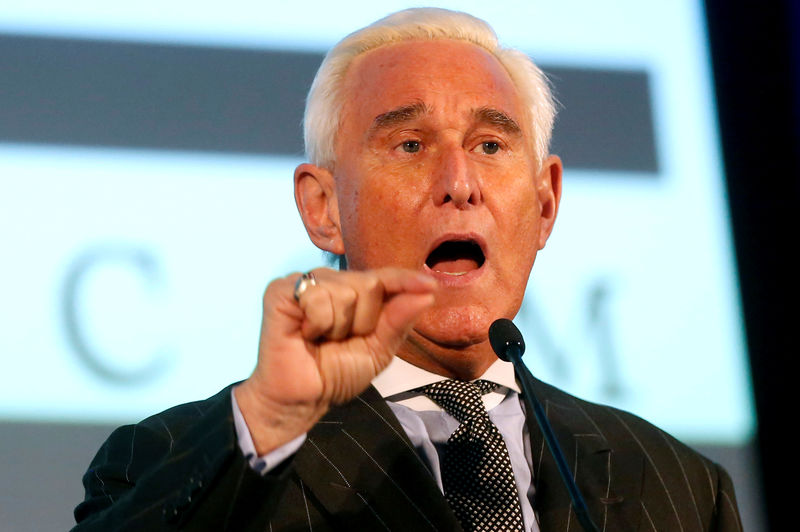By Mark Hosenball and Ginger Gibson
WASHINGTON (Reuters) - A U.S. congressional panel will send a transcript of its interview with Roger Stone, a close political ally of President Donald Trump, to prosecutors investigating possible coordination between Trump's 2016 election campaign and Russia, a committee source said on Thursday.
Democrats who take control of the U.S. House of Representatives Intelligence Committee next month have signaled they plan to send Special Counsel Robert Mueller the transcripts of testimony given under oath by some of Trump's closest associates so they can be reviewed for evidence and possible falsehoods.
During the 2016 campaign, longtime Republican political operative Stone posted messages on Twitter implying that he had inside knowledge of data in the possession of hackers and WikiLeaks that would embarrass the Democrats. Stone denies having such inside or advance information.
Stone's lawyer Grant Smith said on Thursday that he sent a letter to the committee's outgoing Republican chairman requesting that the full transcript of the private Sept. 26, 2017 interview be publicly released.
A spokesman for Mueller's office declined to comment.
The committee source said that, despite antagonisms between the outgoing Republican majority and the incoming Democratic majority, the vote to provide Mueller with the transcript was not contentious.
Some House Republicans have been Trump's fiercest defenders and critics of investigations the president has repeatedly called a political witch hunt, denying collusion with Moscow. U.S. intelligence agencies concluded that Russia ran an operation to undermine Democratic presidential candidate Hillary Clinton and the American electoral process.
Russia denies election meddling. Mueller has secured guilty pleas from several former Trump aides including his former campaign chairman and national security adviser, and has indicted several Russia nationals and entities.
Stone has said he may well face charges, but denies any wrongdoing.
His lawyer Smith said in his letter on Thursday that Stone "never had advance knowledge of the source or content of any releases by WikiLeaks or other organizations."
Private messages between WikiLeaks and Stone seen by Reuters indicate that while Stone did contact the website before the election, WikiLeaks criticized Stone for making "false claims of association" which it said were "being used by the Democrats to undermine the impact of our publications."
In the months preceding the vote, WikiLeaks released emails hacked from computers used by Clinton's senior campaign adviser John Podesta and the Democratic National Committee.

Mueller's team has interviewed several of Stone's friends and associates. Stone has declined requests from the Senate Judiciary and Intelligence Committees to provide documents and to be interviewed.